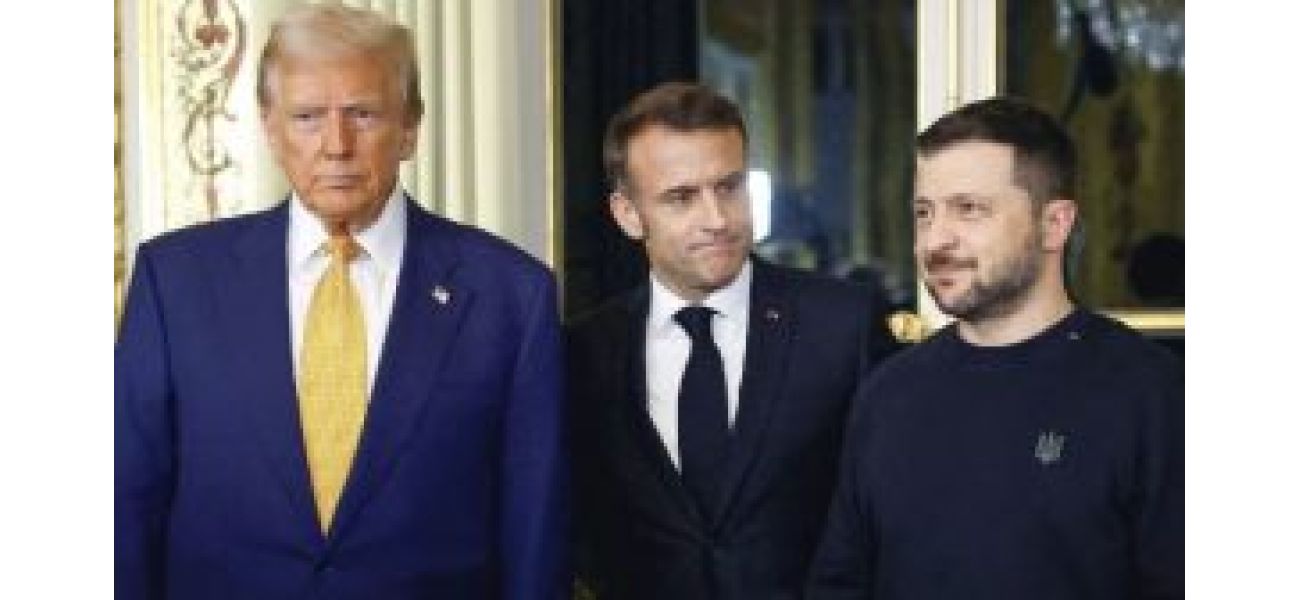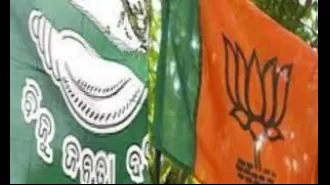Macron and Sunak travel to Washington to convince Trump about providing aid to Ukraine.
French and British leaders visit Washington to dissuade Trump from abandoning Ukraine in peace talks with Russia. Good cop, bad cop approach by UK PM.
February 23rd 2025.

London: This week, the leaders of France and Britain are headed to Washington, DC in a joint effort to convince President Donald Trump not to abandon Ukraine in the midst of its three-year war with Russia. It's a bit of a good cop, bad cop situation as UK Prime Minister Keir Starmer and French President Emmanuel Macron work together to secure American support for Kyiv.
Starmer, who is more hesitant to directly confront Trump, sees himself as a bridge between Europe and the US administration. On the other hand, Macron has been more vocal in criticizing Trump's recent statements, which seem to align with Russia's narrative, and his attempts to negotiate with Moscow while sidelining Ukraine. Both leaders emphasize the importance of Ukraine's voice and sovereignty in any peace negotiations.
In fact, Macron even warned Trump against appearing weak in the face of Russian President Vladimir Putin, saying, "It's not you, it's not your trademark, and it's not in your interest." Macron is scheduled to meet with Trump on Monday, which coincides with the third anniversary of Russia's invasion of Ukraine. Starmer will follow suit on Thursday.
This double-track diplomacy comes after Macron called a crisis meeting of European leaders in Paris last week to discuss the next steps for the continent. And, as if on cue, Trump claimed on Friday that Macron and Starmer haven't done enough in the past three years to end the war. This criticism may be unwarranted, as Macron is known for his bold diplomatic moves and is determined to persuade Trump that American and European interests are aligned. He plans to tell Trump, "If you let Russia take over Ukraine, it would be unstoppable."
Meanwhile, Starmer has taken a more cautious approach, avoiding direct confrontations with Trump or criticism of his actions. However, the UK did join the US in refusing to sign a joint declaration at a recent Artificial Intelligence summit hosted by Macron in Paris. This was seen as an attempt to gain favor with Washington. Despite this, Starmer has reiterated Britain's support for Ukraine and rejected Trump's claim that Ukrainian President Volodymyr Zelenskyy is a dictator. He also refuted Trump's suggestion that Ukraine started the war, which actually began when Russia invaded its neighbor on February 24, 2014.
In fact, Starmer recently spoke with Zelenskyy on the phone and expressed the UK's unwavering support for Ukraine, as well as their commitment to securing a just and lasting peace. When he meets with Trump in Washington, Starmer plans to stress the importance of safeguarding Ukraine's sovereignty.
However, some historians argue that the idea of Britain acting as a transatlantic bridge may not be as stable as it seems. According to Oxford University Professor Margaret MacMillan, "The 'special relationship' has always been more important from the British end. When it comes down to it, great powers tend to do what suits them." So, while Macron and Starmer may want the US to remain involved in Europe, their ability to achieve this remains uncertain.
Macron and Starmer also plan to push for Ukraine's inclusion in negotiations about its future. They hope to gain US support for a plan that involves deploying European troops as a reassurance force to ensure Ukraine's security. However, this plan will only work with a US "backstop," most likely in the form of American air power, to deter any potential attacks from Russia.
Trump may be skeptical of this plan, as he has previously questioned the value of NATO and complained about the US providing security for European countries that don't contribute enough. Macron and Starmer have acknowledged this concern and are willing to increase their countries' defense spending. France currently spends just over 2% of its GDP on the military, while Britain spends 2.3%. Starmer has announced plans to raise this to 2.5%, and he may even set a date for reaching this target during his trip to Washington.
Retired senior NATO official Jamie Shea suggests that Starmer appeal to Trump's desire to leave a lasting impact. Shea says, "The main argument Starmer can make is to say to the President, 'This is going to be your peace agreement. You did it, and for better or worse, you will be associated with it forever. Do you really want to risk failure?'" Perhaps this reminder will persuade Trump to support the plan.
Aside from peace negotiations, Macron and Starmer also plan to discuss trade and tariffs with Trump. The US has imposed tariffs on its trading partners and threatened to do the same with Canada and Mexico. However, UK officials believe that their country's departure from the EU and relatively balanced trade with the US will help them avoid harsh tariffs. Starmer also wants to address Trump's suggestion of deporting Palestinians from Gaza so that the US can take control of the territory. Additionally, he hopes to alleviate US concerns about the UK's agreement to hand over the Chagos Islands, which are home to a strategic US military base, to Mauritius.
And, if all else fails, Britain can always rely on the power of the monarchy. According to reports, Starmer plans to present Trump with an invitation from King Charles III for a state visit complete with royal pomp and pageantry. We'll have to wait and see if this gesture has any effect on the negotiations.
Starmer, who is more hesitant to directly confront Trump, sees himself as a bridge between Europe and the US administration. On the other hand, Macron has been more vocal in criticizing Trump's recent statements, which seem to align with Russia's narrative, and his attempts to negotiate with Moscow while sidelining Ukraine. Both leaders emphasize the importance of Ukraine's voice and sovereignty in any peace negotiations.
In fact, Macron even warned Trump against appearing weak in the face of Russian President Vladimir Putin, saying, "It's not you, it's not your trademark, and it's not in your interest." Macron is scheduled to meet with Trump on Monday, which coincides with the third anniversary of Russia's invasion of Ukraine. Starmer will follow suit on Thursday.
This double-track diplomacy comes after Macron called a crisis meeting of European leaders in Paris last week to discuss the next steps for the continent. And, as if on cue, Trump claimed on Friday that Macron and Starmer haven't done enough in the past three years to end the war. This criticism may be unwarranted, as Macron is known for his bold diplomatic moves and is determined to persuade Trump that American and European interests are aligned. He plans to tell Trump, "If you let Russia take over Ukraine, it would be unstoppable."
Meanwhile, Starmer has taken a more cautious approach, avoiding direct confrontations with Trump or criticism of his actions. However, the UK did join the US in refusing to sign a joint declaration at a recent Artificial Intelligence summit hosted by Macron in Paris. This was seen as an attempt to gain favor with Washington. Despite this, Starmer has reiterated Britain's support for Ukraine and rejected Trump's claim that Ukrainian President Volodymyr Zelenskyy is a dictator. He also refuted Trump's suggestion that Ukraine started the war, which actually began when Russia invaded its neighbor on February 24, 2014.
In fact, Starmer recently spoke with Zelenskyy on the phone and expressed the UK's unwavering support for Ukraine, as well as their commitment to securing a just and lasting peace. When he meets with Trump in Washington, Starmer plans to stress the importance of safeguarding Ukraine's sovereignty.
However, some historians argue that the idea of Britain acting as a transatlantic bridge may not be as stable as it seems. According to Oxford University Professor Margaret MacMillan, "The 'special relationship' has always been more important from the British end. When it comes down to it, great powers tend to do what suits them." So, while Macron and Starmer may want the US to remain involved in Europe, their ability to achieve this remains uncertain.
Macron and Starmer also plan to push for Ukraine's inclusion in negotiations about its future. They hope to gain US support for a plan that involves deploying European troops as a reassurance force to ensure Ukraine's security. However, this plan will only work with a US "backstop," most likely in the form of American air power, to deter any potential attacks from Russia.
Trump may be skeptical of this plan, as he has previously questioned the value of NATO and complained about the US providing security for European countries that don't contribute enough. Macron and Starmer have acknowledged this concern and are willing to increase their countries' defense spending. France currently spends just over 2% of its GDP on the military, while Britain spends 2.3%. Starmer has announced plans to raise this to 2.5%, and he may even set a date for reaching this target during his trip to Washington.
Retired senior NATO official Jamie Shea suggests that Starmer appeal to Trump's desire to leave a lasting impact. Shea says, "The main argument Starmer can make is to say to the President, 'This is going to be your peace agreement. You did it, and for better or worse, you will be associated with it forever. Do you really want to risk failure?'" Perhaps this reminder will persuade Trump to support the plan.
Aside from peace negotiations, Macron and Starmer also plan to discuss trade and tariffs with Trump. The US has imposed tariffs on its trading partners and threatened to do the same with Canada and Mexico. However, UK officials believe that their country's departure from the EU and relatively balanced trade with the US will help them avoid harsh tariffs. Starmer also wants to address Trump's suggestion of deporting Palestinians from Gaza so that the US can take control of the territory. Additionally, he hopes to alleviate US concerns about the UK's agreement to hand over the Chagos Islands, which are home to a strategic US military base, to Mauritius.
And, if all else fails, Britain can always rely on the power of the monarchy. According to reports, Starmer plans to present Trump with an invitation from King Charles III for a state visit complete with royal pomp and pageantry. We'll have to wait and see if this gesture has any effect on the negotiations.
[This article has been trending online recently and has been generated with AI. Your feed is customized.]
[Generative AI is experimental.]
0
0
Submit Comment





